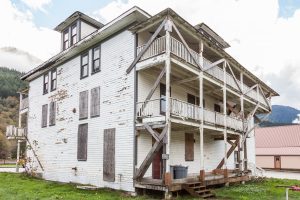Fixer-Upper: What To Know
What to Fix When Buying a Fixer-Upper
It’s the investor’s dream –find a house in poor condition in a good location, make some repairs and give it a fresh coat of paint inside and out, and sell it for substantially more money than was put in. While that dream comes true for many investors, there’s a lot of hard work involved. It’s also crucial to know what you can and can’t fix, at least as far as making a profit is concerned.
Structural Soundness
Before considering any fixer-upper, hire a professional to inspect it and determine whether the dwelling is structurally sound. If there are large cracks in the foundation, you don’t need an engineer to tell you the house isn’t worth the restoration cost. Stay away from any property with structural soundness issues, and that includes wooden homes with extensive termite damage.
Cosmetics
Your best bet is a house requiring only cosmetic repairs. Money spent on painting, wallpapering, refinishing or replacing flooring, installing new cabinetry, repairing or replacing broken windows and installing new doors and light fixtures is well-spent, since these relatively easy and inexpensive fixes should allow you to sell the house fairly quickly. Curb appeal is critical, so invest in decent landscaping, pavers and the like to make the house as attractive as possible at first sight.
The Roof
The roof’s condition is obvious even to the casual observer, and a leaky roof not only threatens the home’s soundness, but can cause mold and mildew issues. If you’re lucky, a roof might need just a few simple repairs. Perhaps a roofer can install a new roof on top of the current roof, which is costly but not astronomical. The most expensive proposition is tearing off the old roof and replacing it, and that may not make economic sense if your goal is selling for a quick profit.
HVAC
If the HVAC system isn’t working properly or needs serious upgrades, you’ll need to fix or replace it before putting the home on the market. If you’re installing a new HVAC system, look for the most energy efficient units possible. Not only are you helping the environment, it’s a good selling point for the house.
Kitchen and Baths
The kitchen and baths can really sell a home. A kitchen renovation, however, is expensive. Rather than a complete overhaul, paint the kitchen, let in as much light as possible, put in new cabinets and replace old appliances.
Bathroom renovations aren’t usually as involved as kitchen renovations and putting in new sinks, toilets and tub/shower units make an older home look newer and fresher.
Up to Code
Of course, everything in your fixer-upper must prove up-to-code before you can sell it or live in it. That means what you must fix depends on the individual home. Bringing a house up to code might not cost that much, or it could end up a deal breaker as far as renovation and resale. If you aren’t familiar with local zoning codes, your realtor can help point you in the right direction.
Contact Us
If you’re looking to buy or sell a home or find a rental or investment property, you need a knowledgeable, experienced realtor familiar with all aspects of the Hawaiian real estate market. Contact Island Realty Group LLC at 808-689-7407 or IslandRealtyGroup@irghi.com.


